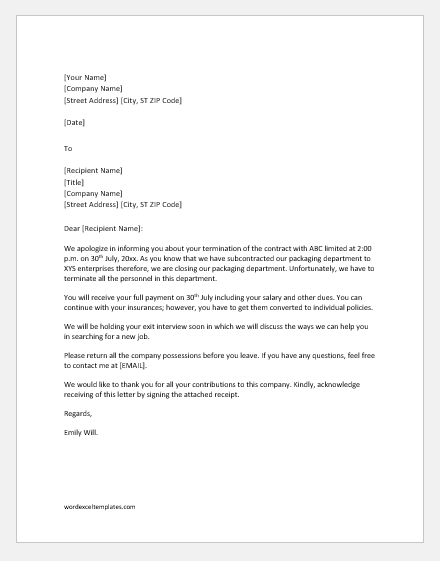A notice of termination is a formal notification issued by an employer to an employee to notify the employee about his/her end of the contract with the employer. However, according to the Fair Work Act, an employer has to provide the required notice period to an employee when an employment contract is being terminated.
There is a difference between termination and cancellation of the contract. Cancellation occurs when an employee breaches or defaults in a contract and the employer wants to end the contract. This is mentioned in the cancellation clause in the contract. On the other hand, termination is about an employer ending a contract for reasons other than breach or default.
In certain circumstances, it may not be easy to fire an employee or end his employment contract as employees have many rights. However, termination of a contract is possible if there had been an agreement between an employee and the employer about contract termination previously. Usually, in a contract, an exit clause is mentioned which acts as a tool that helps in ending an employment contract when an employee does not fulfill or dishonors agreed upon terms of the contract.
An employer can choose one of the following legal ways to terminate a contract:
- Termination clause – an employee signs a contract with an employer which usually states how the contract can be ended both by the employer as well as the employee. The termination clause is a clause in a legally binding contract/agreement that allows for the termination with certain conditions, such as several notice days, the penalty for early termination, etc., mentioned in the clause. By making use of this clause, the employer can take the appropriate action.
- Impossible contract – there could be many reasons that would make the continuation of the contract impossible for the employer. However, they should not be self-created. For instance, if a factory gets destroyed in a fire, the employer can no longer hold the contract with the employee and he is legally allowed to end it.
- The frustration of purpose – in a contract, both parties should be aware of the purpose of the contract. For instance, if an employee is hired for a special project but that project gets canceled by the client, the employer can claim frustration of purpose.
- Failure of condition – sometimes, employees are hired to perform a special task but if they fail to perform, which is a condition/requirement set in a contract, the employer can fire the employee.
- Negotiation – if an employer wants to end an employee’s contract even before the termination clause allows, he may negotiate with the employee and they may reach an arrangement (such as some payment) which makes the termination of contract easy for the employer.
- Breach of contract – if an employee breaches the contract OR does not fulfill the terms of the contract, the employer can claim the breach and end the contract himself.
- Rescind or void – rescission is a term used to refer to unmaking or unwinding of a contract which means bringing the employer and employee to a point where they were before signing the employment contract. Making a contract rescind means officially reversing the contract. An employer can rescind a contract in the circumstances such as:
- Agreement between employer and employee
- Issues with the formation of a contract
- Employee’s non-fulfillment of terms
- The public interest is being affected
When an employer hires an employee, the contract signed is legally binding on both parties and the employer has to have a valid legal reason behind the termination of the contract.
When making a contract, misrepresentation needs to be avoided. In contract law, a misrepresentation is a statement of fact that is either not true or is misleading to attract the other party into agreeing with the contract. This is defined as actionable misrepresentation. In negligent misrepresentation, the defendant makes an honest mistake by believing the false statement to be true, however, the reasons behind the belief were not reasonable.
There is a provision in law for termination for default. This is the employer’s right to fully or partially terminate the employee’s contract if the employee is being unable to fulfill or is anticipated to fail in performing his contractual obligations.
Sample Notification Letter for End of Contract
Dear Mr. XYZ,
We apologize for informing you about your termination of the contract with ABC Limited at 2:00 p.m. on 30th July, 20xx. As you know we have subcontracted our packaging department to XYZ enterprises, therefore, we are closing our packaging department. Unfortunately, we have to terminate all the personnel in this department.
You will receive your full payment on 30th July including your salary and other dues. You can continue with your insurance; however, you have to get them converted to individual policies.
We will be holding your exit interview soon in which we will discuss the ways we can help you in searching for a new job.
Please return all the company possessions before you leave. If you have any questions, feel free to contact me at [EMAIL].
We would like to thank you for all your contributions to this company. Kindly, acknowledge receiving this letter by signing the attached receipt.
Regards,
Emily Will.
Preview
- First Warning Letter for Negligence of Duty
- Ramadan Schedule Notification for Staff
- One Day Absent Note to Boss
- Request Letter to Staff for Voluntary Deduction from Salary
- Holiday Closing Messages
- Letter Requesting Transfer to another Department
- Letter Requesting Promotion Consideration
- Umrah Leave Request Letter to Boss
- Ramadan Office Schedule Announcement Letters/Emails
- Letter to Friend Expressing Support
- Letter to Employer Requesting Mental Health Accommodation
- Letter Requesting Reference Check Information
- Letter Requesting Salary Certificate
- Letter Requesting Recommendation from Previous Employer
- One Hour Off Permission Letter to HR

